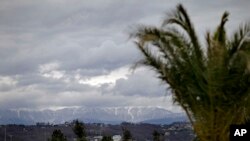As world athletes head to Sochi, Russia, for the 22nd Olympic Winter Games, their success may depend a lot on the weather. Nine of the 15 sports take place outdoors and require snow or ice. There is already concern over forecasts that the weather leading up the Games is expected to turn milder, which could lead to deteriorating conditions on the slopes.
According to a new study, climate change will become more of a problem in the future, given the steady rise in global temperatures
Researchers at the University of Waterloo in Canada and Management Center Innsbruck in Austria analyzed weather conditions for all 19 cities that have hosted the Winter Olympics since the Games began in 1924.
Lead author and climate expert Daniel Scott from the University of Waterloo says historic records and climate predictions indicate that by mid-century, only 10 of those cities could host the Games.
“By the end of the century, that number dropped to as low as six under the warmest scenario,” he said.
Fewer cities cold enough to host Games
The Winter Games require weather cold enough to make snow and sustain a snowpack. Beginning in the 1980s, host cities began taking measures to ensure that. They made artificial snow and built refrigerated tracks for luge and bobsled. High resolution weather forecasts also helped in day-to-day operations.
But the planet has been warming since the 1950s, as more carbon emissions from cars, power plants and buildings spew into the atmosphere. Vancouver was hit by a warm front a week before the 2010 Olympics, too warm to make snow.
“They had to bring in the straw bales," Scott said. "They put what limited snow they could over top of those. And that was just sufficient to do some of the moguls and some of the other types of events that were scheduled there.”
Some question whether Sochi, a seaside town, will fare any better. It is the warmest city ever to host the Winter Olympics, with an average temperature of 10 degrees Celsius. Outdoor events are scheduled many kilometers away.
Report recommends IOC look at alternatives
Scott says the report recommends that the International Olympic Committee consider new venues like northern China, which has the elevation for downhill ski events, and new partnerships.
“Maybe Seattle and Salt Lake City could make a rebid," he suggested, "where you have a main Olympic venue, a bigger city that can accommodate the size that the Olympics has grown to, but there will be a secondary location with a smaller part of the Games that has all the skiing events, and it is located in a much more climate reliable location.”
Scott says while the report highlights the challenges that lie ahead for Olympic athletes, it also underscores the decline in areas suitable for any winter sports enthusiast in a warmer world, unless dramatic steps are taken to reduce climate changing emissions.
According to a new study, climate change will become more of a problem in the future, given the steady rise in global temperatures
Researchers at the University of Waterloo in Canada and Management Center Innsbruck in Austria analyzed weather conditions for all 19 cities that have hosted the Winter Olympics since the Games began in 1924.
Lead author and climate expert Daniel Scott from the University of Waterloo says historic records and climate predictions indicate that by mid-century, only 10 of those cities could host the Games.
“By the end of the century, that number dropped to as low as six under the warmest scenario,” he said.
Fewer cities cold enough to host Games
The Winter Games require weather cold enough to make snow and sustain a snowpack. Beginning in the 1980s, host cities began taking measures to ensure that. They made artificial snow and built refrigerated tracks for luge and bobsled. High resolution weather forecasts also helped in day-to-day operations.
But the planet has been warming since the 1950s, as more carbon emissions from cars, power plants and buildings spew into the atmosphere. Vancouver was hit by a warm front a week before the 2010 Olympics, too warm to make snow.
“They had to bring in the straw bales," Scott said. "They put what limited snow they could over top of those. And that was just sufficient to do some of the moguls and some of the other types of events that were scheduled there.”
Some question whether Sochi, a seaside town, will fare any better. It is the warmest city ever to host the Winter Olympics, with an average temperature of 10 degrees Celsius. Outdoor events are scheduled many kilometers away.
Report recommends IOC look at alternatives
Scott says the report recommends that the International Olympic Committee consider new venues like northern China, which has the elevation for downhill ski events, and new partnerships.
“Maybe Seattle and Salt Lake City could make a rebid," he suggested, "where you have a main Olympic venue, a bigger city that can accommodate the size that the Olympics has grown to, but there will be a secondary location with a smaller part of the Games that has all the skiing events, and it is located in a much more climate reliable location.”
Scott says while the report highlights the challenges that lie ahead for Olympic athletes, it also underscores the decline in areas suitable for any winter sports enthusiast in a warmer world, unless dramatic steps are taken to reduce climate changing emissions.





